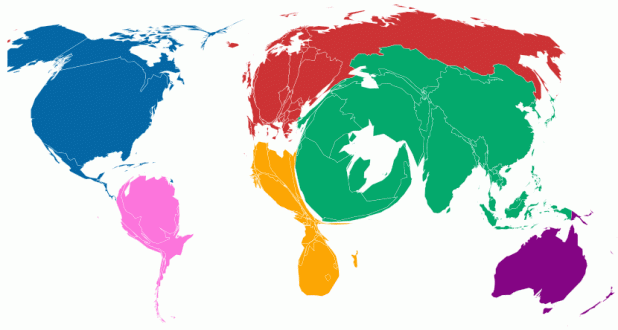A recent book illustrates neatly the problem of how difficult climate change will be to solve, given that different countries have starkly different interests at stake. “The burning question”, by Mike Berners-Lee and Duncan Clark, describes a number of the challenges that need to be overcome in order to deal with climate change, including some economic and technological issues, but there are important international political questions at its heart.
(This marvellous book also finds words for those nagging questions like, if a product becomes more efficient by using less energy and therefore becomes cheaper, what happens to the money that is freed up as a result of that lower cost? The answer is that, in general, it gets spent on other goods and services that themselves use energy. Energy efficiency, therefore, while a necessary part of any climate solution, is not necessarily in the short term a solution to anything. Now you know.)
Of course, first, it is possible that the climate is not changing, or that human activity is not causing it to change, or indeed that the world is balanced on the back of a turtle, but overwhelmingly the most likely interpretation of the scientific results is that burning fossil fuels, such as coal, oil and gas, releases carbon dioxide into the atmosphere and the resulting increase in the concentration of CO2 traps heat and makes the planet warmer. To reverse, or to stop, or even to slow, this process means burning fewer fossil fuels. Technologies will be required that can substitute for burning fossil fuels, and the bulk of those fuels that have not yet been burned will likely have to remain in the ground.
And this is one of the problems. Those fossil fuels are not evenly distributed around the world. The map below shows where they are concentrated – the larger the country on the map, the greater the reserves.

And the greater the reserves, the greater the amount that is going to have to be written off. The top 10 countries (the US, Russia, China, Australia, Venezuela, Iran, Saudi Arabia, India, Canada and Kazakhstan) possess nearly three quarters of total reserves, so the losses are going to be concentrated on a few of them. One estimate is that the write-off might be worth, at current prices, $35 trillion, or 50 per cent of world GDP. It is surely no accident that these are the countries that are currently most reluctant to take part in comprehensive schemes to fight climate change.
Mike Berners-Lee and Duncan Clark also note that the countries that are most active in promoting climate change policies are, by contrast, those with the smallest reserves of fossil fuels. This includes the European Union. As this website has observed regarding other issues in the past, economic self-interest helps when it comes to taking the right political decisions.
To find an effective solution for climate change, therefore, needs a design of economic incentives that encourages everyone to take part. (As we saw with the simple matter of energy efficiency earlier, if a scheme is not comprehensive it risks merely transferring the problem from one place to another rather than actually dealing with it.) And that in turn requires political institutions that can take into account the different and conflicting interests to produce a system that works in the common interest of all. As Mike Berners-Lee and Duncan Clark put it,
the time is right for a move beyond pledges towards a rules-based system with fewer moving parts to negotiate
Patching together national attempts to reduce carbon dioxide emissions, however well-intentioned, will not do.

This has got to be the biggest scam of all time. The sooner people wake up and see this is not about Global warming…oops Climate change. It’s about controlling energy reserves around the globe. It is a finite resource and yes we need to find alternatives to fossil fuels, and also nuclear. Technology and research are still very much in the early stages of development, but the net effect of Green Taxes has mean fossil fuel powered power stations and heavy industry closing down, well before this infrastructure is in place. The result will inevitably be powercuts and massive job losses to countries not signed up to this global deception as more of them close down. Many people may have fallen for this fraud and it’s hardly surprising with the government spin machine on full throttle and like minded guardianistas in the media.
Read the story by Hans Christian Anderson The Emporors New Clothes and you will get a good idea how many who don’t believe, but have to keep up the pretence for fear of appearing stupid or ignorant to see what i mean. The sooner these Climate Change scammers are locked up the better.